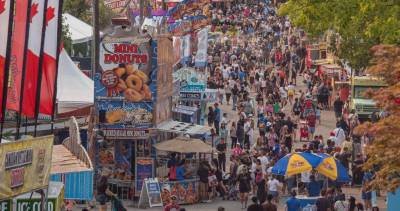FIRE movement fans aren't panicking over plunging stock markets
One of Vancouver’s more popular financial bloggers, Chrissy Kay, isn’t freaking out over the recent downturn in the markets.
Even though the S & P 500 index is down nearly 17 percent this year, the creator of the Eat Sleep Breathe FI website has some calming words of advice.
“If you zoom out to the maximum time frame [on Google Finance], you’ll see that the dip in the market is nothing,” Kay tells the Straight by phone. “It’s not even close to where we dipped to in 2020. We’re still way above that point.”
The “FI” in her blog stands for “financial independence”—something she and her husband achieved by retiring last year at the ages of 43 and 46, respectively. Kay only refers to her husband as “M” on her blog because he values his privacy. He was an art director at a video-game company. She is a former graphic designer and the mother of two teenagers.
Kay did not come from a wealthy family—her parents immigrated from Hong Kong without a lot of money—and she wrote her first post in May of 2017. A year later, she bought the domain because she felt that there was a “severe lack of knowledge and information about financial independence for Canadians”.
“Right from the start, I wanted my blog to be helpful and not just an online diary,” Kay says. “I do mix my own story in there when it’s helpful to give examples and to make it relatable to people.”
Because she includes the voices of many others, she has a good sense of what people in the so-called FIRE movement are feeling right now. FIRE is an acronym for “financial independence, retire early”. They tend to live more frugally than others, setting aside money to invest. But Kay says it’s a “huge myth” that they all live deprived lives.
“We are simply more thoughtful with our spending,” she declares. “We spend in areas that we value.”
She says that when people try to save money, they “end up inadvertently saving the planet” because they tend to consume less.
According to Kay, most people in the FIRE movement invest in index funds, which generate returns based on a particular stock-market index.
“It’s tried and true,” Kay says. “It’s easy. It’s cheap. It’s simple.”
However, she adds, there are some in the FIRE movement who dabble in individual stocks or more speculative investments such as cryptocurrencies.
So how are they reacting to the recent market downturn, along with the return of inflation and rising interest rates?
“There are many people in the community who use a technique called the ‘Smith Manoeuvre’, so they’ve leveraged their homes to invest more in the markets,” Kay reveals. “So there’s a little bit more chatter about those kinds of topics.”
According to the Investopedia website, the Smith Manoeuvre “involves converting the interest a homeowner pays on their mortgage into tax-deductible investment loan interest”. It was pioneered by a Vancouver Island financial planner named Fraser Smith.
While it can help investors make more money and pay less tax when the equity markets are rising, people can go into debt if they borrow to buy stocks that are sinking.
She says that in light of the uncertainty, some in the FIRE movement are trying to feel out what others are doing. Others believe that the recent pullback simply means that stocks are on sale at bargain prices.
“We were long overdue for a market correction, so we were all expecting this,” Kay concludes. “It doesn’t come as a surprise.”















Comments